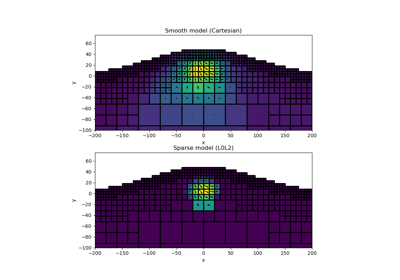simpeg.maps.SphericalSystem#
- class simpeg.maps.SphericalSystem(mesh=None, nP=None, **kwargs)[source]#
Bases:
IdentityMapMapping vectors from spherical to Cartesian coordinates.
Let \(\mathbf{m}\) be a model containing the amplitudes (\(\mathbf{a}\)), azimuthal angles (\(\mathbf{t}\)) and radial angles (\(\mathbf{p}\)) for a set of vectors in spherical space such that:
\[\begin{split}\mathbf{m} = \begin{bmatrix} \mathbf{a} \\ \mathbf{t} \\ \mathbf{p} \end{bmatrix}\end{split}\]SphericalSystemconstructs a mapping :math:`mathbf{u}(mathbf{m}) that converts the set of vectors in spherical coordinates to their representation in Cartesian coordinates, i.e.:\[\begin{split}\mathbf{u}(\mathbf{m}) = \begin{bmatrix} \mathbf{v_x} \\ \mathbf{v_y} \\ \mathbf{v_z} \end{bmatrix}\end{split}\]where \(\mathbf{v_x}\), \(\mathbf{v_y}\) and \(\mathbf{v_z}\) store the x, y and z components of the vectors, respectively.
Using the mesh or nP input arguments, the dimensions of the corresponding mapping operator can be permanently set; i.e. (3*mesh.nC, 3*mesh.nC) or (nP, nP). However if both input arguments mesh and nP are
None, the shape of mapping operator is arbitrary and can act on any vector whose length is a multiple of 3; i.e. has shape (*,*).- Parameters:
- mesh
discretize.BaseMesh The number of parameters accepted by the mapping is set to equal 3*mesh.nC .
- nP
int Set the number of parameters accepted by the mapping directly. Used if the number of parameters is known. Used generally when the number of parameters is not equal to the number of cells in a mesh.
- mesh
Notes
In Cartesian space, the components of each vector are defined as
\[\mathbf{v} = (v_x, v_y, v_z)\]In spherical coordinates, vectors are is defined as:
\[\mathbf{v^\prime} = (a, t, p)\]where
\(a\) is the amplitude of the vector
\(t\) is the azimuthal angle defined positive from vertical
\(p\) is the radial angle defined positive CCW from Easting
Attributes
Determine whether or not this mapping is a linear operation.
The mesh used for the mapping
Number of parameters the mapping acts on.
Dimensions of the mapping
Methods
deriv(m[, v])Derivative of mapping with respect to the input parameters
dot(map1)Multiply two mappings to create a
simpeg.maps.ComboMap.inverse(u)Maps vectors in Cartesian coordinates to spherical coordinates.
test([m, num, random_seed])Derivative test for the mapping.
sphericalDeriv
